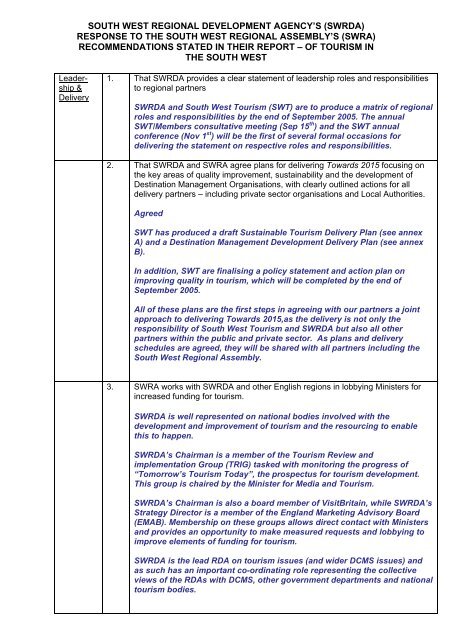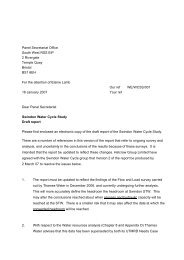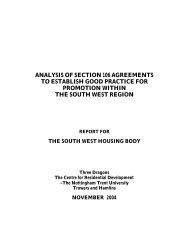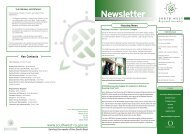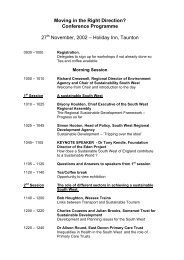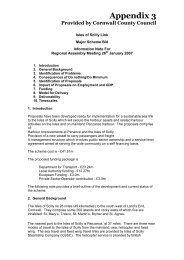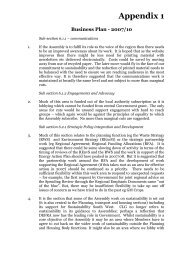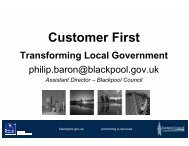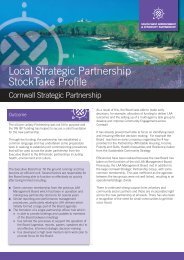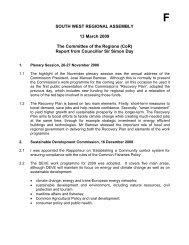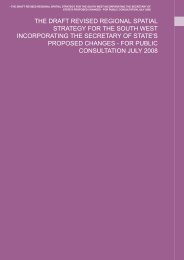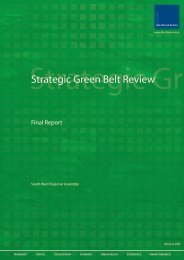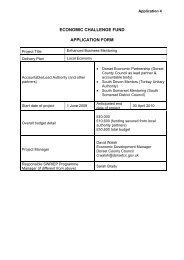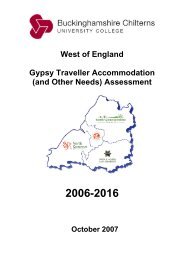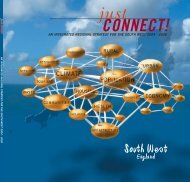RDA Response - South West Regional Assembly
RDA Response - South West Regional Assembly
RDA Response - South West Regional Assembly
You also want an ePaper? Increase the reach of your titles
YUMPU automatically turns print PDFs into web optimized ePapers that Google loves.
SOUTH WEST REGIONAL DEVELOPMENT AGENCY’S (SW<strong>RDA</strong>)RESPONSE TO THE SOUTH WEST REGIONAL ASSEMBLY’S (SWRA)RECOMMENDATIONS STATED IN THEIR REPORT – OF TOURISM INTHE SOUTH WESTLeadership&Delivery1. That SW<strong>RDA</strong> provides a clear statement of leadership roles and responsibilitiesto regional partnersSW<strong>RDA</strong> and <strong>South</strong> <strong>West</strong> Tourism (SWT) are to produce a matrix of regionalroles and responsibilities by the end of September 2005. The annualSWT/Members consultative meeting (Sep 15 th ) and the SWT annualconference (Nov 1 st ) will be the first of several formal occasions fordelivering the statement on respective roles and responsibilities.2. That SW<strong>RDA</strong> and SWRA agree plans for delivering Towards 2015 focusing onthe key areas of quality improvement, sustainability and the development ofDestination Management Organisations, with clearly outlined actions for alldelivery partners – including private sector organisations and Local Authorities.AgreedSWT has produced a draft Sustainable Tourism Delivery Plan (see annexA) and a Destination Management Development Delivery Plan (see annexB).In addition, SWT are finalising a policy statement and action plan onimproving quality in tourism, which will be completed by the end ofSeptember 2005.All of these plans are the first steps in agreeing with our partners a jointapproach to delivering Towards 2015,as the delivery is not only theresponsibility of <strong>South</strong> <strong>West</strong> Tourism and SW<strong>RDA</strong> but also all otherpartners within the public and private sector. As plans and deliveryschedules are agreed, they will be shared with all partners including the<strong>South</strong> <strong>West</strong> <strong>Regional</strong> <strong>Assembly</strong>.3. SWRA works with SW<strong>RDA</strong> and other English regions in lobbying Ministers forincreased funding for tourism.SW<strong>RDA</strong> is well represented on national bodies involved with thedevelopment and improvement of tourism and the resourcing to enablethis to happen.SW<strong>RDA</strong>’s Chairman is a member of the Tourism Review andimplementation Group (TRIG) tasked with monitoring the progress of“Tomorrow’s Tourism Today”, the prospectus for tourism development.This group is chaired by the Minister for Media and Tourism.SW<strong>RDA</strong>’s Chairman is also a board member of VisitBritain, while SW<strong>RDA</strong>’sStrategy Director is a member of the England Marketing Advisory Board(EMAB). Membership on these groups allows direct contact with Ministersand provides an opportunity to make measured requests and lobbying toimprove elements of funding for tourism.SW<strong>RDA</strong> is the lead <strong>RDA</strong> on tourism issues (and wider DCMS issues) andas such has an important co-ordinating role representing the collectiveviews of the <strong>RDA</strong>s with DCMS, other government departments and nationaltourism bodies.
Through this role and the <strong>RDA</strong> Tourism Leads Group regular meetings andcontact with DCMS takes place which includes discussion around presentand future funding arrangements for tourism.SW<strong>RDA</strong> on behalf of the other <strong>RDA</strong>s continues to take every opportunity inits contact with government departments and ministers to lobby forincreased funding to support tourism initiatives that contribute toestablished strategies.SW<strong>RDA</strong> would also welcome proposals from SWRA on additional activitythat SWRA could undertake in this area.<strong>Regional</strong>StrategicFit4. That SW<strong>RDA</strong>:Work with SWRA and the SWLGA to encourage support from a wide range ofpublic and private sector organisations in the region for Towards 2015.<strong>South</strong> <strong>West</strong> Tourism has been actively working with our partners, byexample undertaking numerous presentations to Local Authorities andother organisations over the last year to: -• Firstly, explain the rationale and evidence based behind Towards2015,• Secondly to explain in detail the strategy and priorities for actionand to gain agreement and support for 2015 and the resultingaction plan.• Finally to stimulate our partners to instigate action and deliveryplanning in their organisation and geographical sectoral footprintTo-date, all those who have received a presentation accept the evidencebase and the key messages within it and have endorsed the principlesbehind the 3 major objectives;• Driving up quality• Delivering sustainable tourism• Improving the destination management arrangements.However, it is early days and there will have to be continued close workingbetween SWT, SW<strong>RDA</strong>, the <strong>Regional</strong> <strong>Assembly</strong>, Local Authorities and theLGA to ensure that the in principle agreements already reached will movethrough to shared and targeted actions.5 Promotes the aims of Just Connect by ensuring that Towards 2015 supportsagreed regional objectives and there is consistency with other key regionalstrategies:SW<strong>RDA</strong> welcomes this recommendation. Towards 2015 represents a stepchange from previous regional tourism strategies in that it specificallyhighlights the need to consider the environmental and social implicationsof the sector’s future development. We believe, therefore, that the strategyis well placed to support many of the aims set out in Just Connect’. Forexample, the second strategic aim of Towards 2015 is to ‘deliversustainable tourism’, and action to deliver this will directly contribute tothe key objectives around protecting the environment. SW<strong>RDA</strong> willcontinue to work with SWT to help ensure that Just Connect continues tosteer the ongoing development and delivery of Towards 2015.
6 Ensure that the aims and objectives of Towards 2015 are reflected in nationalmarketing and strategies.AgreedSWT works closely with VisitBritain (VB) and is undertaking combinedplanning to ensure that regional and sub-regional marketing “nest” withinthe overall marketing of England, as well as being integrated with VB’sinternational marketing.This will ensure the most effective use of resources and enjoy maximumbenefit from a coherent set of supportive marketing companies.All publicly funded (or part publicly funded marketing) must be integratedand therefore add value at national, regional and sub-regional levels.As the Destination Management Organisations (DMOs) develop, the needto improve the working between national, regional and destinationmarketing will be a high priority in order to improve further theeffectiveness of public sector investment in destination, regional andnational marketing.MonitoringandImplementation7 SW<strong>RDA</strong> works with partners to:Improve the quality of data on tourism in the <strong>South</strong> <strong>West</strong> (including new analysisto monitor levels of sustainability).SW<strong>RDA</strong> acknowledges that accurate tourism data and statistics are vitalfor informing investment decisions, for policy formulation and fordeveloping targets and monitoring. As such, SW<strong>RDA</strong> recognises theimportance of improving the quality of tourism statistics as an aid to betterstrategic economic planning and has been actively involved in progressingthis agenda.DCMS published their National Review of Tourism Statistics report in June2004. The report highlighted gaps in existing national tourism surveys aswell as the need to increase the quality of the current statistical base e.g.the quality of the samples and the level of the response rates of thesurveys. Subsequently, the <strong>RDA</strong>s (represented by SW<strong>RDA</strong> and NWDA)joined a national group tasked with developing an implementation planbased on the report. The group met in July and September 2004 andfollowing the outcome of the 2004 Spending Review allocations, itsconclusions were published.The group made several suggestions, with the improvement of the UKTourism Survey (UKTS) being viewed as the main priority. With onlylimited funds available from DCMS following the Spending Reviewallocations, this is the only suggestion that has been taken forward to date.The <strong>RDA</strong>s are continuing to discuss this issue with DCMS (through thetourism leads group and SW<strong>RDA</strong>’s representation on the Tourism Reviewand Implementation Group, TRIG) but there would appear to be little or noprospect of additional funds available from DCMS for data improvements.<strong>RDA</strong> discussions with DCMS will therefore focus on what improvementsmight be made which incur little or no cost. This has significantly movedthe goalposts from the original recommendation in the Review that anadditional £7m - £8m investment per annum was required.
In addition to their involvement in the above, the <strong>RDA</strong>s have alsocollectively funded a pilot project into the development of regional tourismsatellite accounts (TSA project) to identify the wider economic benefits oftourism at a regional level. This has been undertaken by the CardiffBusiness School and resulted in the <strong>RDA</strong>s holding a launch event inBirmingham on 22 July. The event was attended by ONS, <strong>RDA</strong>s, <strong>Regional</strong>Delivery Partners, VisitBritain, Academics and <strong>Regional</strong> Observatories. The<strong>RDA</strong>s are keen to progress with regional TSAs and will be discussing nextsteps at a <strong>RDA</strong> Tourism Leads meeting in September. However, theregional TSA project is in part dependent on improvements to data at a UKnationallevel and as such, without DCMS acting on the recommendationsfrom the National Tourism Statistics Review, only very limited progress willbe possible at the regional level towards TSAs.As part of the delivery of Towards 2015 <strong>South</strong> <strong>West</strong> Tourism (utilisingSW<strong>RDA</strong> funding) has commissioned KPMG to undertake a comprehensivereview to establish tourism impact measures to ensure that we caneffectively, monitor the delivery, evaluate the impact of actions withinTowards 2015 and measure improving sustainability.KPMG will conclude this in October 2005 and this will then be used as thebasis for monitoring and evaluating at local, sub-regional and regionallevels.In addition SW<strong>RDA</strong> and SWT are keen to see how the new tourism satelliteaccounting system can be implemented and improved to give a greaterunderstanding of the real value that tourism adds at local, regional andsub-regional level.Current trade position and forecast/Foreword planning tools are also ahigh priority for development.8 Ensure that clear, measurable objectives are included in plans for deliveringTowards 2015. In carrying out its strategic leadership role in tourism, SW<strong>RDA</strong>should regularly monitor and review progress against plans for deliveringTowards 2015. In carrying out its strategic leadership role in tourism SW<strong>RDA</strong>should regularly monitor and review against plans for the delivery of Towards2015.Agreed<strong>South</strong> <strong>West</strong> Tourism is working with SW<strong>RDA</strong> through its fundingagreements as well as the overall monitoring and evaluation mechanism inTowards 2015, so that professional monitoring of the activities undertakenby <strong>South</strong> <strong>West</strong> Tourism and its partners can be completed. In additionthere will be an effective evaluation plan to measure the impact.9 Ensure ongoing consultation processes are in place with SW Local Authoritiesas well as the tourism industry, to provide feedback and share information.AgreedSWT will continue to have regular Consultative Committee Meetings. Thisgroup includes key representatives from tourism industries, as well asofficers and elected members of Local Authorities across the region.In addition <strong>South</strong> <strong>West</strong> Tourism is committed to continue to meet withsenior executive and political leaders and Local Authorities across the<strong>South</strong> <strong>West</strong> to first of all, maintain support for Towards 2015, and informthem of the activities undertaken and engage in solving the challenges thatwe will all face in delivering this ambitious agenda.
QualityandCompetitiveness10 That the SW<strong>RDA</strong> and SWLGA work with Local Authorities to support the nationalQuality in Tourism strategy.Agreed.It is vital that <strong>South</strong> <strong>West</strong> Tourism, SW<strong>RDA</strong> and SWRA work with LocalAuthorities to move towards a region-wide policy of ‘assessed onlyaccommodation in publicly funded guides, promotion and websites.This means all public funded agencies should only support businessesthat are either National Quality Assured or managed by an accreditedagency, or within the proposed entry-level standards scheme. This willrequire the SWLGA assisting SWT to apply influence to those LocalAuthorities that have not yet adopted these policies.A meeting is to be held in the Autumn of 2005, with the SWLGA to discussthis matter, and pursue the agenda of minimum quality assurance criteriaacross the whole region.11 That SW<strong>RDA</strong> works with partners to clarify how resources will be used toestablish, fund and develop Destination Management Organisations.AgreedIt should be stressed that one of the first priorities within the agreedstrategy for Towards 2015 approved by the SW<strong>RDA</strong> Board in June 2004,was that “the redirection of existing resources should be undertaken”before the application of any new resources.As there is approximately £27-£30 M invested by Local Authorities in themanagement and marketing of tourism across the region. The first priorityfor the emerging Destination Management Organisations (DMOs) will be tocomplete an audit of all the existing resources, both public and private, todemonstrate that these have been more effectively used before anyconsideration can be given for supplying additional funding.12 That SW <strong>RDA</strong> works with Business Links, the Tourism Skills Network and otherkey partners to develop further tourism-specific programmesSW<strong>RDA</strong> has been supporting the Tourism Skills Network via a three-yearagreement, now in its third year, between 2003-2006. The contract holder isDestination Bristol, who employs the TSN staff.An outline proposal has been submitted to continue the work of TSN for afurther three years, but with a significant shift in its role.Over the last 12 months the TSN staff have been working with partners andstakeholders, including the <strong>RDA</strong> Tourism Cross Directorate Group,Business Link, GOSW, Job Centre Plus and the LSC, employers andcolleges to develop a “Tourism Skills Development Plan,” fully integratedwith the regional tourism strategy “Towards 2015” and looking at thelonger term needs of the <strong>South</strong> <strong>West</strong>’s tourism sector.While previously delivery focused the next phase will take on a mostlystrategic role with the following key objectives:• To develop an umbrella funding and delivery framework tosupport tourism skills development activity throughout theregion
• increase the engagement of the sector in relevant, effectivetraining leading to the development of a skilled workforce• identify the sector’s skills needs and work closely witheducation and training providers to meet those needs• support sub-regional Destination Management Organisations(DMOs) in the development of their local workforce developmentplansAs part of the extensive consultation behind the development of theregional tourism strategy “Towards 2015”, a review of TSN’s effectivenessand standing was commissioned – which provided a strong endorsementof its operation. This supports the SW<strong>RDA</strong> view that TSN is a highlyeffectiveand productive organisation and has managed to succeed in spiteof the complexities of a multiplicity of funding streams and deliveryorganisations and the somewhat restrictive output requirements of somefunding bodies.The new plan will seek to ensure that skills development activity is alignedto the strategic objectives outlined in the national tourism strategy“Tomorrows Tourism Today” the regional tourism strategy “Towards2015”.13 That SW<strong>RDA</strong> work with the SWLGA and Local Authorities to compile bestpractice on public transport options for tourism.The <strong>RDA</strong> Transport Team is currently working with the <strong>Regional</strong> <strong>Assembly</strong>to ensure an inter-relationship between the RES and RSS/RTS. Thisincludes policies in RTS which relate to tackling congestion andaccessibility in urban areas as well as accessibility issues in rural areas.Encouraging better public transport is part of the solution package whichwill benefit all economic sectors including tourism. The strategic interregionaltransport network (air, sea, road and rail) plays an important partin bringing tourists into the region and the <strong>RDA</strong> and RA work closely indeveloping strategies in each of these areas and identifying regionalpriorities and best practice.The <strong>RDA</strong> previously published a guide for organisations preparing travelplans which set out a framework for their use and adoption, which couldbe applied to specific tourism developments. Through developing the RTSand other work, the <strong>RDA</strong> is already working the RA to provide theframework from which best practice may be established.There are several examples of public transport initiatives where people areencouraged to leave their cars and move to public transport options to getto the destinations, including:• X53, Jurassic Coast initiative• St Ives train and ride approach• Development of Boat and Ride• Fal River Links project in Cornwall• Lulworth & Monkey World bus
Environment andAccess14 SWRA works with SW<strong>RDA</strong> and other partners to consider the distinct spatialneeds for tourism in the RSS.The Agency welcomes this recommendation. Recent research hasprovided a more robust understanding of how tourism and the region’sother key sectors are likely to develop spatially over the next 20 years.This intelligence provides the Agency and <strong>Assembly</strong> with the basis fordeveloping appropriate spatial policy responses (through the <strong>Regional</strong>Spatial Strategy and Local Development Frameworks) to support the futurecompetitiveness of the Tourism SectorSW<strong>RDA</strong> are engaged with the SWRA on the production of the RSS, inparticular under the Economy topic. This will include a detailedconsideration of the spatial aspects of Towards 2015, after discussion withSWT and other stakeholders, such as the need for a specific tourismsection within the RSS15 That SW<strong>RDA</strong> and SWLGA work together with Local Authorities and LocalStrategic Partnerships in developing Destination Management Organisations.AgreedSWT are keen that as the individual DMO delivery plans are developed,they should firstly adopt the VICE model – (Visitors Industry Communityand Environment) to drive the delivery for sustainability and thatDestination Management Plans should be fully integrated into the LocalStrategic partnerships and delivery plans.Communities16 That Destination Management Organisations embed sustainability principles (asoutlined in Future Footprints and RSDF) in decision-making.AgreedSWT and SW<strong>RDA</strong> do not see sustainability as a ‘bolt-on’ function. It is akey function in its own right as well as a cross cutting function into quality,destination management, brand clusters, training and all activities withintourism.


